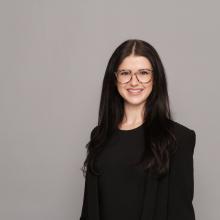Erica McAdam
Why did you decide to pursue a graduate degree?
Pursuing a graduate degree is both a personal and professional commitment for me. As the first woman in my family to undertake graduate-level education, I am deeply motivated to honour the sacrifices and resilience of the matriarchs who came before me. Their hard work has afforded me the privilege and opportunity to pursue this path, and I am committed to making the most of this opportunity to develop into an independent scientist dedicated to advancing equity and social justice. My decision to pursue doctoral studies is grounded in a commitment to improving the health and well-being of people who use drugs and their communities — particularly in the context of the ongoing toxic drug supply crisis. I believe that equity-focused research, rooted in the lived expertise of people who use drugs, is a powerful tool for advancing compassionate, evidence-informed policy change. When deciding to pursue doctoral studies, a mentor in my life said to me that we have a responsibility to be the best we can for the people that we serve. That has become my underlying motivation.
Why did you decide to study at UBC?
I chose to study at the University of British Columbia because of its reputation as a world-renowned institution and its longstanding commitment to academic excellence, innovation and social impact. UBC consistently ranks among the top public universities globally and is recognized for its leadership in research that addresses pressing social and environmental challenges. UBC’s strong academic community, combined with its location in Vancouver, British Columbia — the epicentre of Canada’s toxic drug crisis — makes it the ideal place to conduct meaningful, policy-relevant research that can drive real-world change.
What is it specifically, that your program offers, that attracted you?
UBC offers the leading Interdisciplinary Studies Graduate Program in Canada, which provides an exceptional level of flexibility for students to design research that bridges multiple disciplines. The program’s structure allows me to work with co-supervisors from different faculties, enabling access to diverse disciplinary expertise and methodological approaches — an essential foundation for addressing complex public health challenges. This unique model fosters innovation and collaboration, making it an ideal environment to pursue rigorous, equity-focused research that transcends traditional academic boundaries.
What was the best surprise about UBC or life in Vancouver?
When I first moved to Vancouver, I was astonished by its natural beauty. The combination of mountains, ocean and diverse flora makes it one of the most stunning places I’ve ever been. Living here has renewed my appreciation for the outdoors and allowed me to fully embrace activities I love, including snowboarding, hiking and camping.
What aspects of your life or career before now have best prepared you for your UBC graduate program?
Taking nearly five years off between my undergraduate and graduate studies to work full-time was one of the most valuable experiences in preparing me for my program at UBC. During that time, I gained clarity on my values, developed a stronger sense of purpose and cultivated the discipline and time management skills needed for graduate-level research. Stepping away from academia helped me return to school with a renewed commitment to learning and a deep motivation to engage in work that aligns with my passions and long-term goals.
What advice do you have for new graduate students?
Given the flexibility and self-direction required in doctoral studies, my advice to new graduate students is to actively create a timeline of key milestones and target dates to help keep yourself on track. It’s easy to lose momentum without a clear structure, especially when working on long-term projects. Setting realistic goals — and revisiting them regularly — can help maintain focus and make the workload feel more manageable.
Learn more about Erica's research
The unprecedented levels of morbidity and mortality caused by Canada’s toxic drug supply are a public health catastrophe. In response to rising toxic drug deaths, the government of British Columbia (BC) enacted a public health emergency in 2016. The primary driver of this crisis is the introduction of fentanyl and other synthetic molecules (e.g., benzodiazepines) into the unregulated drug supply (so-called street drugs). In BC, fentanyl is ubiquitous in the unregulated drug supply and is detected in over 85% of overdose deaths. Provincial governments across Canada have implemented a range of interventions to reduce toxic drug mortality. Within the BC context, innovative pilot programs like the decriminalization of personal possession and provision of prescribed pharmaceutical alternatives are both being evaluated. Both programs are focused on harm reduction: decriminalization to reduce the harm of interactions with the criminal justice system among people who use drugs, and prescribed safer supply, to reduce or eliminate exposure to the toxic drug supply with prescribed pharmaceutical alternatives. There is limited evidence evaluating the impacts of these innovative policy responses and a dearth of research evaluating impacts on specific sub-groups of people who use drugs, including structurally marginalized youth and young adults. Among youth and young adults who use drugs (YWUD), there is an overrepresentation of individuals who have experienced childhood trauma and other adverse childhood events. Moreover, YWUD experience worse uptake and retention rates in opioid agonist therapies in comparison to older adults who use drugs — highlighting the unique risk environment facing this group. Given the limited research evaluating the impacts of innovative policy responses to the toxic drug supply crisis, this dissertation proposes to fill this gap and undertake an evaluation of the impacts of prescribed safer supply and the decriminalization of personal possession on street-involved youth and young adults who use drugs in Vancouver, BC.
